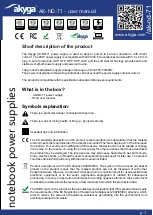
WARNING
Slipping, tripping and
falling hazards
There is a risk of slipping or tripping or falling, for
example tripping on the hoses or on other objects.
Slipping or tripping or falling can cause injury. To
reduce this risk:
►
Always make sure that no hose or other object is
in your way or in any other person's way.
►
Always make sure you are in a stable position with
your feet as far apart as your shoulders width and
keeping a balanced body weight.
WARNING
Dust and fume hazard
Dusts and/or fumes generated or dispersed when
using the machine may cause serious and permanent
respiratory disease, illness, or other bodily injury (for
example, silicosis or other irreversible lung disease
that can be fatal, cancer, birth defects, and/or skin
inflammation).
Some dusts and fumes created by compaction work
contain substances known to the State of California
and other authorities to cause respiratory disease,
cancer, birth defects, or other reproductive harm.
Some examples of such substances are:
>
Crystalline silica, cement, and other masonry
products.
>
Arsenic and chromium from chemically-treated
rubber.
>
Lead from lead-based paints.
Dust and fumes in the air can be invisible to the
naked eye, so do not rely on eye sight to determine
if there is dust or fumes are the air.
To reduce the risk of exposure to dust and fumes,
do all of the following:
►
Perform site-specific risk assessment. The risk
assessment must include dust and fumes created
by the use of the machine and the potential for
disturbing existing dust.
►
Use proper engineering controls to minimize the
amount of dust and fumes in the air and to
minimize build-up on equipment, surfaces,
clothing, and body parts. Examples of controls
include: exhaust ventilation and dust collection
systems, water sprays, and wet drilling. Control
dusts and fumes at the source where possible.
Make sure that controls are properly installed,
maintained and correctly used.
►
Wear, maintain and correctly use respiratory
protection as instructed by your employer and as
required by occupational health and safety
regulations. The respiratory protection must be
effective for the type of substance at issue (and if
applicable, approved by relevant governmental
authority).
►
Work in a well ventilated area.
►
If the machine has an exhaust, direct the exhaust
so as to reduce disturbance of dust in a dust filled
environment.
►
Operate and maintain the machine as
recommended in the operating and safety
instructions
►
Wear washable or disposable protective clothes
at the worksite, and shower and change into clean
clothes before leaving the worksite to reduce
exposure of dust and fumes to yourself, other
persons, cars, homes, and other areas.
►
Avoid eating, drinking, and using tobacco
products in areas where there is dust or fumes.
►
Wash your hands and face thoroughly as soon as
possible upon leaving the exposure area, and
always before eating, drinking, using tobacco
products, or making contact with other persons.
►
Comply with all applicable laws and regulations,
including occupational health and safety
regulations.
►
Participate in air monitoring, medical examination
programs, and health and safety training
programs provided by your employer or trade
organizations and in accordance with
occupational health and safety regulations and
recommendations. Consult with physicians
experienced in relevant occupational medicine.
►
Work with your employer and trade organization
to reduce dust and fume exposure at the worksite
and to reduce the risks. Effective health and safety
programs, policies and procedures for protecting
workers and others against harmful exposure to
dust and fumes must be established and
implemented based on advice from health and
safety experts. Consult with experts.
Operating, precautions
WARNING
Incorrect usage
An incorrect use of the machine, accessories, and
insertion tools/ cutting blades can result in serious
injuries or a hazardous situation.
►
Use the machine, accessories and tools in
accordance with the safety instructions.
►
Use the machine for what it is designed for, and
in the way it is intended.
►
Use the correct machine for the work that is going
to be performed.
►
Do not force the machine while operating.
►
Take the working conditions into account.
7
9800 1635 01 | Original instructions
Safety and operating instructions
LBG 804
Summary of Contents for LBG 804
Page 1: ...Safety and operating instructions Vibrating screeds LBG 804 www cp com...
Page 2: ...9800 1635 01 Original instructions 2 LBG 804...
Page 4: ...9800 1635 01 Original instructions 4 LBG 804 Safety and operating instructions...
Page 19: ...19 9800 1635 01 Original instructions LBG 804...
Page 20: ...2014 11 No 9800 1635 01 Copyright Construction Tools EOOD...






































